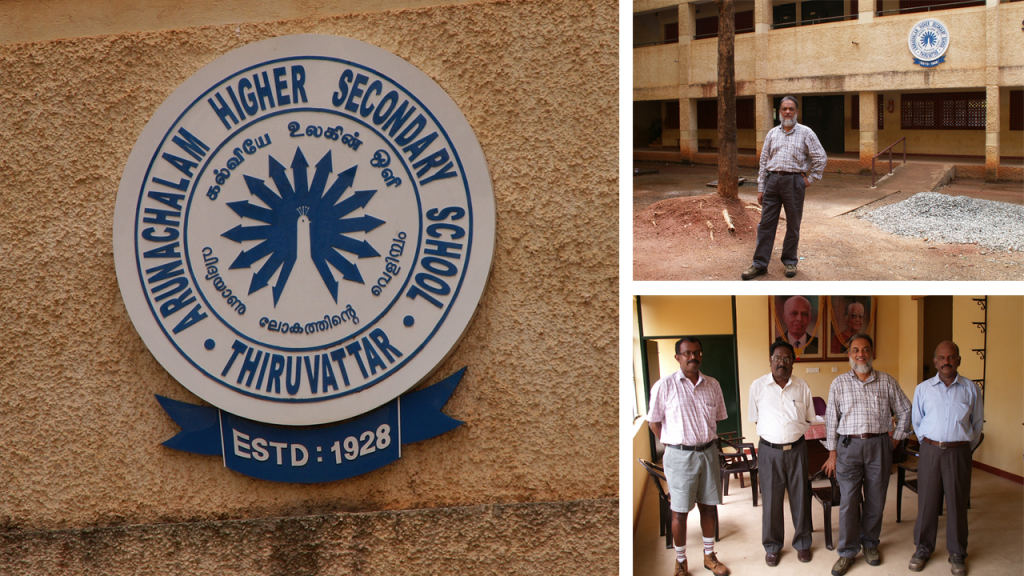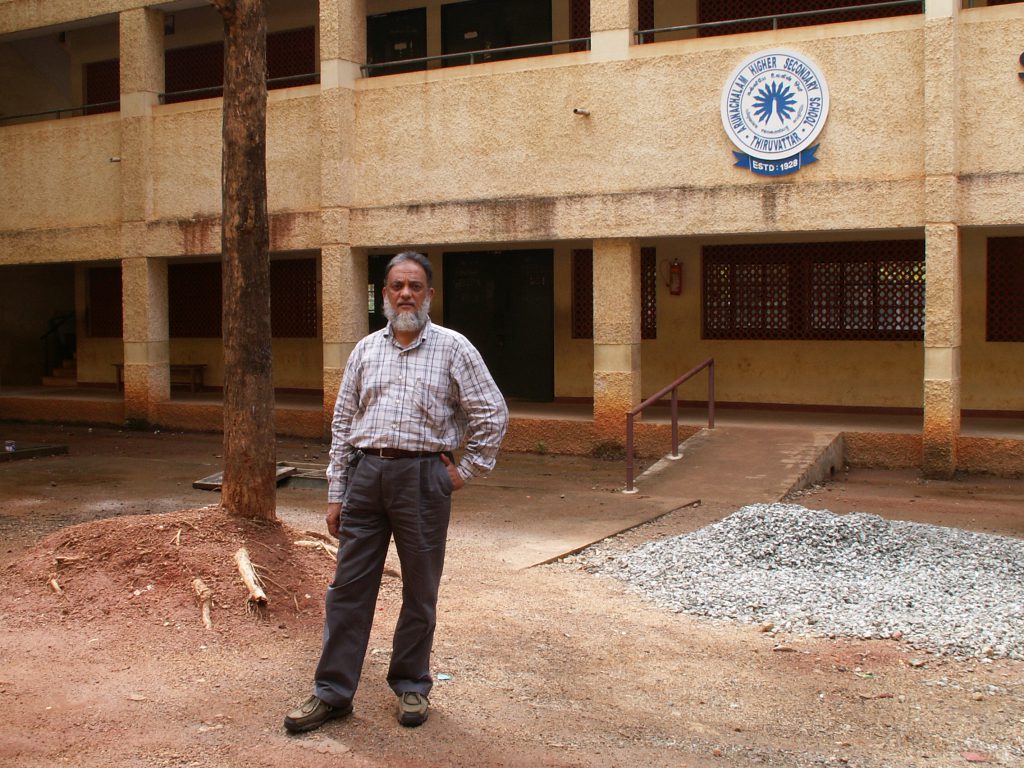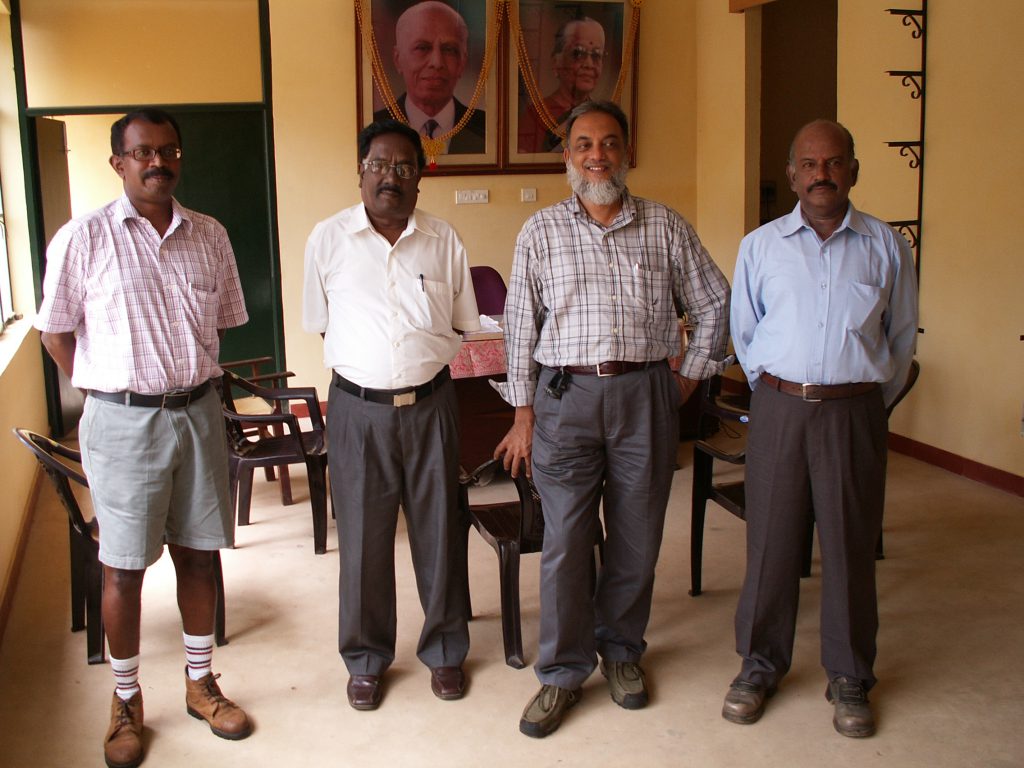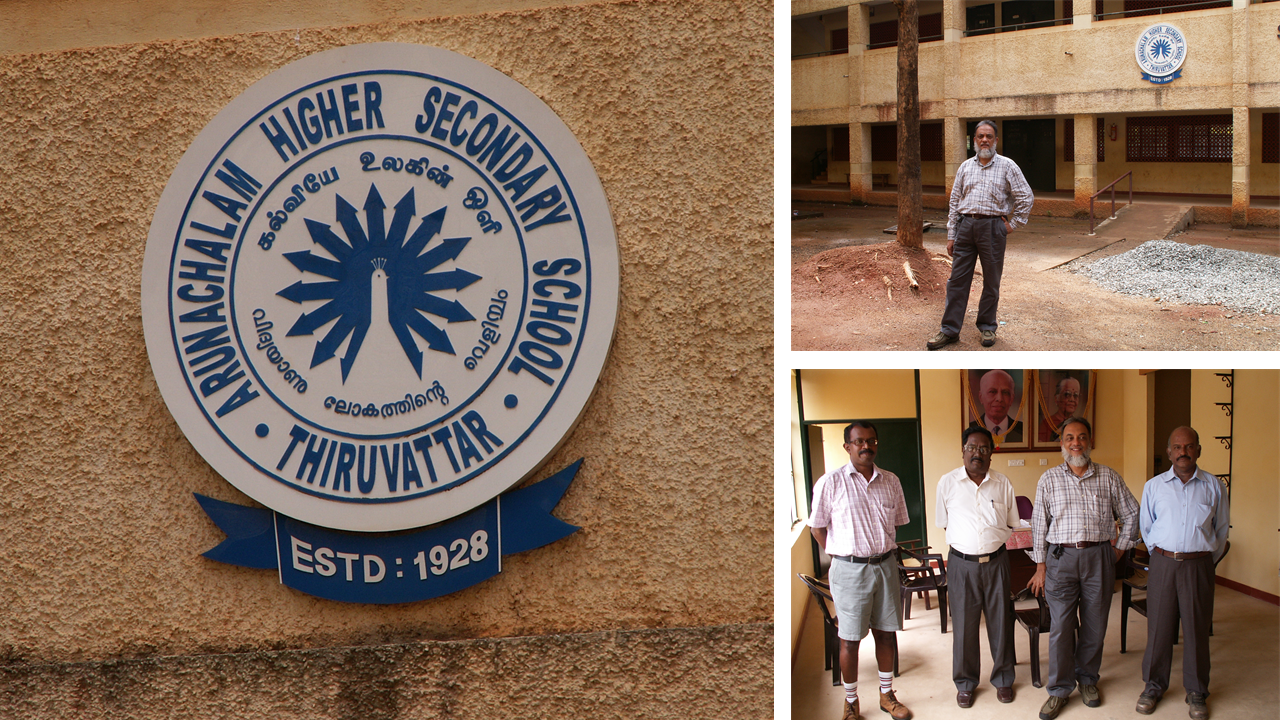
The story is so interesting and unusual and so incredibly satisfying for me, that I must tell it to you in detail. The Murugappa family is involved in all sorts of social work, most of which is done under the auspices of the AMM Arunachalam Charitable Trust. One of those initiatives was the AMM Arunachalam Higher Secondary School in a place called Thiruvattar, some distance away from Ambadi, and close to Marthandam which is in Kerala. The Ambadi Manager was the ‘Correspondent’ of the school and represented the owner, which was the Trust. He was the head of the school and the Headmaster reported to him. This school was not in good shape academically with extremely poor results in the Board exams and was losing students. The Trust provided free education so losing students was not an economic concern, but it reflected very badly on the school management. This school was very close to Mr. AMM’s heart and he would always visit it whenever he came to Ambadi. He and his wife always stayed with us (they always stayed with the Ambadi Manager) in the guest annexe attached to the bungalow and ate with us.
After dinner we would all sit together, my wife and I with Mr. AMM and his wife, and we would talk about many things. It was during these sessions that he told me the history of his family from where they started in Burma, their move to India after WW2 and their foray into manufacturing, to become one of the biggest manufacturing groups in the country. All this conversation happened almost totally in Tamil. Mr. AMM spoke fluent English but preferred speaking in Tamil which was his mother tongue. And since I speak it fluently (it is not my mother tongue) he spoke to me in Tamil. I cherished these sessions as I was well aware of their worth as I was learning about entrepreneurship and family business from one of the pioneers. That is why when two decades later, I wrote my book, ‘The Business of Family Business’, I dedicated it to Mr. AMM Arunachalam, who taught me what it is to head a formidable business family with great aplomb and finesse.
Mr. AMM was very unhappy with the state of affairs in the school and told me, ‘Yawar, I want you to give this school a high priority and put things right. We have put in a lot of investment and time, but you can see that we don’t have the results that we should have. Please report to me directly about the school.’ I gladly agreed because education has always been an abiding interest of mine and here was an opportunity to test my theories in education and see how they worked in practical terms.

The Arunachalam Higher Secondary School was a co-educational school with 1200 students and 75 staff. The students came from extremely poor families who survived on subsistence agriculture and any manual labor that they could get. In the evenings, the men would get drunk and domestic violence was a major social evil. When these children encountered discrimination and ill treatment from teachers also at school, you can imagine what that did to their confidence and enthusiasm for learning. Education was their only lifeline out of that society but sadly they were not getting it despite all the money that the Trust had invested in the school. The medium of instruction was Tamil but English language was taught as a subject in the curriculum. The school was partially aided by the Government of Tamilnadu in the form of salaries of some subject teachers, while the Trust funded everything else, including all capital expenditure to create and maintain all buildings and infrastructure. The school was built on about two acres of land, nice spacious classrooms with plenty of light and ventilation. But walls covered with graffiti and the grounds like a massive garbage dump with paper, plastic, and trash everywhere. The children were in the dumps as regards academic work as the Board exam results amply bore witness, but on their feet, they were very agile. A little observation showed me why. It seemed to me that the teachers operated on the principle that if you could get your hands on a kid you must beat him. You may ask, ‘Why beat the kid, if he didn’t do anything?’ The answer is, ‘He didn’t do anything then. But maybe he did something that you hadn’t seen, or he would do something in the future.’ So, beat him. It is good for him. The relationship between students and teachers was almost adversarial. I spent a couple of days in the school trying to get as much data by direct observation as I could. Then I called for a staff meeting and requested the Headmaster Mr. Madhavan Thambi to arrange it.
It was a memorable meeting though perhaps not for the usual reasons for calling a meeting memorable. It was memorable because the midterm results had come in that week and all the children had failed in English. The entire class had failed. The English teacher was a Mr. Titus who was also the Deputy Headmaster. I was introduced to all the staff members, which took a good bit of time. Then the meeting started. I decided to address the major issue directly and use it as my leverage to push change.
‘I am sure you are all aware of the exam results. What I am amazed about is that every single student failed in English. How did you manage that, Mr. Titus? I consider that an achievement. How did you achieve it?’
Naturally, Mr. Titus was not amused, though there were smiles on many faces. He stood up and said, ‘These are low caste children Sir. What can you expect from them?’
‘What is your caste, Mr. Titus?’ I asked.
There was dead silence. It was clear that this was not stand-up comedy. They were testing me, and I could see that they didn’t like the results. I couldn’t care less. I was so mad at this arrogant, casteism that I had a hard time remaining seated and not punching the man in the face. That someone can be so openly, and shamelessly, racist was beyond me. I was sure that the fact that this man could speak like that meant that this was an accepted attitude in the school. That was simply not acceptable to me.
‘Let me tell you what is going to happen from now on. I want you to listen carefully and tell me if you are with me or not. I am not forcing you to support me, but you also can’t force me to pay the salary of anyone who doesn’t want to support what we plan to do here, which is to make this the best school in Tamilnadu. Are you all with me?’ Everyone nodded. Some raised a hand in confirmation. What else could they do?
This is what we are going to do from now:
- ‘From this moment onwards, no teacher will hit a child, irrespective of what the child does. If you touch a child, I will touch you. If you hit a child, that will be your last action in this school. I hope I am making myself clear.
- Then, you will refer to the children by their names. I am shocked that even class teachers don’t know the names of children. Please learn their names and call them by their names and not, ‘Dey Payyan.’
- Next, in my view exams are an indicator of your teaching. Not of the student’s intelligence. So, I think you deserve a bonus if your students do well in the subjects you teach. I will give the subject teacher a bonus every time your students score over 60%. We will also have a class party with the students and teachers for that class.
- Naturally, if your students do badly, I will expect you to analyze that and share with this whole body a plan to show how you will teach differently so that bad results are never repeated. No punishment but we must learn from our mistakes which can only happen when we own up to the mistake and look for solutions to ensure that it is not repeated.
- God created all people equal. I don’t care about whatever you believe about high and low castes. But you are aware that to refer to someone as ‘low caste’ is against the law in this country. If that happens again, rest assured that I will take the most severe action including criminal prosecution, that is possible under the law. Anyone practicing casteism and racism will be punished to the fullest extent of the law.
With that we ended the first meeting. As I told you, it was memorable.
I introduced the practice of a weekly staff meeting. Strictly speaking this was not what I would have recommended to anyone in my position, because it was the job of the Headmaster to get things done. But after seeing what the state of the school was, I decided that he needed strong support. So, we would meet every Monday in the last class period. I didn’t want to keep teachers in after school as it would be difficult for them to take their normal bus, home. The meeting was ‘work’ and so we did it in the normal working hours.
I asked for a general student assembly and met the whole school. After the usual spiel about improving the school and so on, I did two things which got them to sit up and listen. I introduced myself and said, ‘My name is Yawar Baig and I am the new Correspondent for your school. I want to know what you think about this school, so that we can make it a place that you will love to come to. Tell me are you happy with this school?’ There was total silence. They looked at each other. They looked at the teachers. They looked at me as if to say, ‘Do you think we are fools? Do you think you can talk this stuff and we will believe you and tell you what we feel? Go fly a kite, Mr. Whatever your name is.’ I could see all this in the faces of those sitting in the front row and knew that they represented the others.
I said to them, ‘I want you to elect a Class Representative who will be a member of the Student Council which I am going to set up. Your Class Representative will represent you, so do it carefully. I am giving you one hour of free time, starting now. I want the Class Representatives to meet me for our first Student Council meeting in one hour.’
It is amazing how many things, mostly negative, that we believe (or at least our teachers and other adults believed then) about children. I had not given them any instructions about how to conduct the election. I am not saying that it was done totally fairly or efficiently or that every child had a chance to exercise his or her choice. All I know is that whoever was elected in one hour was someone with innate leadership ability. It took a bit longer than one hour, but we had our first meeting.
I set the ground rules. ‘The Student Council will be comprised of Class Representatives from each class who will be appointed for a period of one term (4 months). This is so that as many of you as possible get to experience being leaders. Class Representatives can be re-elected for a second term but then must sit out two terms before standing for election again. The Student Council will also have three teachers as Honorary Non-Voting Members. Their role will be advisory to provide information and support for whatever the Student Council decides to do. These teachers will change every two quarters, so that they can provide continuity to the new student representatives elected in each quarter. The Student Council will decide how this school will be run. Any questions?’
Hands shot up. I was very happy because questions indicate interest.
‘Sir, what do you mean, ‘How the school will be run?’
‘I mean start and end times, holidays, class duration, whatever you want. It is your school and from now on, you will decide how it will be run. Remember what I asked you in the assembly? Are you happy with this school as it is?’
Strange looks all around. Some teachers looked at me with pity. Some smirked. All looked highly doubtful. Students just deadpanned me. I knew what was going on as I had done other similar initiatives. The first response to all change initiatives is suspicion. People find it difficult to believe that people they have been dealing with for a long time, can change their behavior completely. The solution is consistency and persistence. Announce what you are going to do and do it without worrying about reactions. Once people see you behaving in congruence with what you stated, they come around and realize that you are sincere and will start trusting you. But this takes time and it is important for you as the change agent, not to react to anything they say or do but to continue on your stated path. People listen with their eyes. They don’t care what you say until they see what you do.
In this case, the children had gotten used to being abused and treated without respect. For them to believe that teachers would not beat them any more, that they would not only be treated with respect but here was the highest authority in the school telling them that henceforth the school would be run according to their wishes, was simply too much to swallow. So, they waited and watched.
‘Are you happy with how the school is now?’ I persisted. ‘You can tell us. All of us, teachers, your Headmaster and I want to know. And nothing will happen to you whatever you say. Nobody will get a prize and nobody will be punished. You have my word for it.’
I got some tentative responses from the front rows. ‘No, we don’t like the school as it is.’ I didn’t push them to give me more details. I knew what they wanted to say, and I also knew that they wouldn’t say it. Not then. Not yet.
‘Good. Now you get to change that. Do what you think will make this school the best school in Tamilnadu. That is what I want. Do you want that? In next week’s meeting, I want you to suggest to me what you would like to be changed to make this school the best school in Tamilnadu.’ I knew that for them, even to think of themselves like that was a stretch. But if they started thinking of themselves and their school like that, they would start taking pride in it. If that happened, the rest would be easy and inevitable. It all starts with a thought, which kindles desire, which produces the energy. Direct that into the channels of strategy and you achieve your goal.
I told them that I would attend their weekly meeting, but they could meet as often as they wanted and at any time they wanted. I set some ground rules. I told them that if they identified a problem, I also wanted them to think it through and suggest a solution that we could apply. I didn’t want them to become ‘professional protestors’. I wanted them to become problem solvers. Whatever problem they mentioned would be their problem and who better than they to suggest the solution? The second rule was that the syllabus was a non-negotiable. That had to be completed. So, if they wanted to take time off one day, they would have to work extra time on another day to complete the syllabus. Finally, I reiterated that they would be treated with respect, but that they would have to treat teachers with respect. That meant that what they wanted to do, they would have to discuss with their teachers and get their agreement. I would be happy to facilitate that if they wanted me to, but it was their responsibility. We would not impose anything on them without their agreement. And the same courtesy would apply to the teachers. Everyone agreed. They didn’t know how it would work in practice, but it sounded nice. Teachers also looked happier after hearing this.

In the next week’s meeting, I produced a map of the school grounds on which I had drawn lines to divide it into squares. I said to them, ‘Each square is for one class. It is your Class Thotam (garden). Please pick the square you want and write your class title in the square. Every month I am going to have a competition and will give a prize to the best kept Thotam.’
Kanyakumari district is a fertile place and these children came from farmer’s families. Almost overnight the school got cleaned up. All garbage disappeared and gardens were planted, everywhere except the sports field which was my responsibility to maintain. The teachers also bought into the new spirit and their skepticism turned to enthusiasm. Two or three weeks into the scheme, in the weekly meeting of the Student Council, they asked me, ‘We want permission to come to school on Sunday.’
‘I have no problem with giving you permission, but why do you want to come to school on Sunday,’ I asked.
‘We want to clean up these walls. They look very dirty.’
‘Great. Let’s do it. I will also come. I will provide you with limewash and we will clean and paint the walls and then we will all have lunch together. My treat.’ They were delighted and that is what we did.
Things happened week after week. Change is gradual, even when it is driven strongly top down like I was forced to do it. Exam results improved dramatically because both teachers and students started to take pride in their work. The cherry on the cake was that in the Annual Science Fair, AMM Arunachalam HSS was placed in the second place in the State of Tamilnadu.
Let me answer the question which I am sure is in your minds. Did the Student Council create a revolution? Did I have a teacher rebellion on my hands? Did I get assaulted or even mildly abused? None of the above. The reality is that people in authority live in fear. They think that they need to impose authority by force or the whole house of cards would collapse round their ears. The reality is that if you take people into confidence and show them how following your method will help them to achieve their goals, you will have trouble holding them back.
AMM Arunachalam HSS’s teachers and students were no different. They wanted their school to be the best in the state. But they were caught in the cycle of negativity that a lot of us get caught into without realizing it. My advantage was that I was new. I was not part of the morass of low self-esteem and deteriorating performance that they were stuck in. So, I could institute changes more easily. The good thing was that once we had broken the ice, I had everyone’s full cooperation and we never looked back.

Pictures on the wall: Mr. AMM Arunachalam and Lakshmi Achi his wife.
I want to close with one amusing incident. Mr. Madhavan Thambi insisted on doing a ‘Vote of Thanks’ for every meeting that I attended. I tried in vain to dissuade him from it. He would say in every speech the same thing, ‘We are most grateful to Mr. Baig for taking time off from his multifarious activities to grace this occasion and be with us.’ He would say this same line in the same tone at the end of each meeting. Except one day, when he said, ‘We are most grateful to Mr. Baig for taking time off from his nefarious activities to grace this occasion and be with us.’ To this day I can’t decide whether this was a slip of the tongue or deliberate.
To end the story, the results we were able to achieve in two years were such that when I was leaving Ambadi in the third year, Mr. AMM sent a silver plate, engraved with my name, acknowledging my contribution and thanking me for turning around the school. I am most grateful to him.

Comments (0)
Comments for this post are currently disabled.
Loading comments...